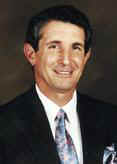Selecting
Our 44th President
by Dr. John E.
Bonfadini, Ed.D., Professor Emeritus, George Mason University

John Bonfadini
|
February is the month of presidents.
In the 229 years since George Washington
was elected as the first president of the
United States
with a unanimous vote, 42 other individuals have served in this office.
In one of my lectures at
George
Mason
University
, I would ask school teachers who were seeking a master�s degree the
following question: If you could cover only three of our nation�s
presidents, which three would you suggest your students get to know? I got
all types of combinations.
It was my contention that the three
should be Washington, Lincoln, and the current president. I followed this
initial question by asking who served as the 11th president of the
United States
. Seldom did anyone have the correct answer. I also asked how many
individuals held the office. Again the answers were reasonable, but few of
the students felt embarrassed if they didn�t know the exact number. With
some questions, �close� is acceptable. Not knowing the 11th president is
also acceptable. Failure to know the current president is unacceptable.
I was educated in the
Pennsylvania
public schools, so I know that the only president from that state was James
Buchanan. Folks in many states believe a president�s birthplace is more
important than his accomplishments. James Buchanan was the 15th president,
serving right before Abe Lincoln. The reason we know some of these men and
not others is because of the situations during their terms of office and
their ability to lead the country during times of strife. In general, we
should know more about the office than the persons who occupied the
position.
This fall voters will have an
opportunity to participate in the process of electing the 44th president of
the
United States
. The candidate pool is more diverse than at any other time in history.
Voters will use a combination of reasons for choosing one candidate over
another, ranging from party to personality. I believe the number-one item on
most voters� minds is how the next president�s platform is going to
affect their pocketbooks. Social issues are important, but I think they�re
a distant second to economics. One haunting question in my own mind is how
much higher a standard of living can I realistically expect.
In a recent conversation, one of my
fishing buddies complained about the state of the
Chesapeake Bay
and the declining quality of fishing. Bill is about my age and is a retired
college professor. He said, �John, I think the best times in this country
are behind us.� I wanted to say, �No, Bill, the
United States
has and always will provide a better life for our kids and grandchildren.�
I didn�t respond because in the back of my mind I thought he may be right.
The
United States
is at the top of the list of countries in providing its citizens the
opportunity to have a high standard of living. Politically and socially our
system of government is one of the best, although in my opinion, it does
need some fine-tuning. Many
countries view
U.S.
citizens as greedy for wanting more when their citizens have so little. The
next president must respond to the concerns and needs of a more global
society, as well as addressing the concerns of the
United States
citizenry. As the only remaining �superpower,� what global role or
responsibility do we have? Is it more important for the president to provide
for bigger and better cars in our driveways, or to help feed the world�s
poor? To what degree should we be the world�s policeman? A safe and secure
environment is a prerequisite to a free society. If we as a nation are going
to promote world democracy, what responsibility do we have for providing a
safe world? These questions are far more complex than some that appear in
the presidential debates. Life will continue to become more complicated for
future generations.
In education, the nearer a student�s
score is to 100 percent, the greater the probability that the student could
regress on another test. For example, a student with an average of 95 out of
100 has a 5-point range to reach perfection. A student who has an average of
60 has a 40-point range to obtain perfection, which makes it much easier to
attain a 5-point gain. I look at the
U.S.
as being a 90-point country, where many other countries that have lower
standards of living will find it easier to make significant gains. Whoever
is elected will have a more difficult time than past presidents in attaining
a small gain or even maintaining our present standard of living.
In 1963, I was standing in front of a
classroom teaching about electronics when the principal came on the P.A.
system and announced that President Kennedy had been assassinated. I was a
fearful young man wondering who would now lead the country. As I�ve
attained senior citizen status, Kennedy�s words, �Ask not what your
country can do for you � ask what you can do for your country,� have
increasingly alleviated that fear.
Presidents are important, and some will
go down in history as more important than others. What is far more important
than who is president is the individual citizen and what contribution he or
she is willing to make toward a better nation and world.
The first step is participation in the
election process by voting � a rather simple task, but one that many find
difficult.
Finally, James K. Polk was the 11th
president of the
U.S.
, a fact that may come in handy if you�re ever on the game show, Are You
Smarter than a Fifth Grader?